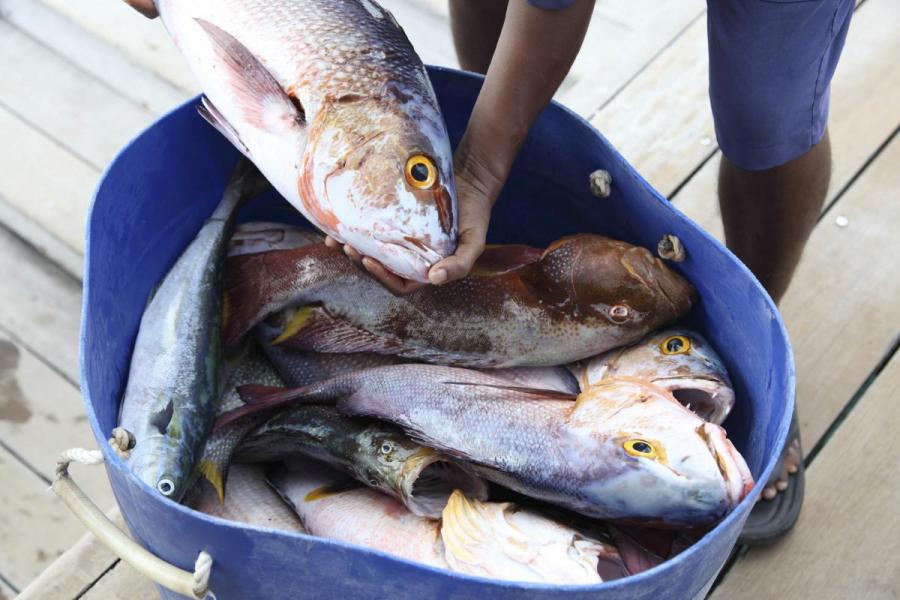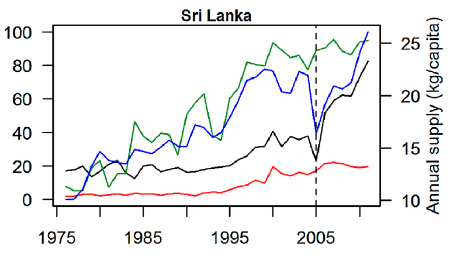
Fisheries are Critical to Global Food Security
Globally, more than one billion people depend on fisheries and aquaculture as a primary source of protein, and an essential source of micronutrients such as zinc, vitamin B12, and omega-3 fatty acids. SESYNC has supported a growing body of literature highlighting the importance of fisheries to human nutrition, and the threats to the sustainability of fisheries.
Dr. Jessica Gephart, a postdoctoral research fellow at SESYNC, led one such paper looking at how shocks to fish supplies may affect human nutrition. The research, published in Global Environmental Change, found that shocks to fish supplies around the world are common, and can have devastating effects on human nutrition.
For example, the tsunami that hit Sri Lanka and Indonesia on Boxing Day in 2004 hurt the livelihoods of many thousands of people. The disaster severely hit the fisheries and aquaculture industries in the region. The Sri Lankan Department of Fisheries estimated that 80 percent of all fishing vessels were destroyed, as well as much of the local fishing infrastructure.
The data that Dr. Gephart included in her paper show a clear decline in fish production in Sri Lanka in 2005, right after the tsunami.

Before the tsunami, Sri Lankan fisheries employed some 163,000 people, and many others depended on fisheries as their main source of food.
Another SESYNC-funded study was published in January by Brendan Fisher, associate professor of environmental studies at the University of Vermont. Dr. Fisher found that in some developing countries up to 45 percent of people are highly dependent on fisheries as a food source.
Although so many people are dependent on fisheries, shocks like the one in Sri Lanka are not unheard of. “We see shocks to seafood production fairly regularly all around the world,” said Dr. Gephart. Her publication found that between 1976 and 2011, there have been 48 shocks to fish production around the world. But why these shocks occur isn’t always as obvious as the devastating Asian tsunami. Dr. Gephart explained, “Shocks can be caused by political decisions, natural disasters, and in some cases, from over-exploitation of fisheries.”
Local shocks to fish production are felt throughout the world because they are the top traded food commodity: 160 million metric tons of fish valued at $136 billion were traded in 2013. But greater demand for fish is threatening the future of fish supplies.
For example, fish catch in the West African country of Ghana dropped off in the year 2000, without any nearby natural disasters. Researchers now think many years of prior overfishing was responsible for the shock. Surprisingly, even though the drop in fish production in Ghana was significant, the amount of fish Ghana exported to other countries remained relatively constant. This implies that the people of Ghana felt the brunt of the fish production shock, and potentially switched to less-nutritious food sources during the decline.
In the long term, overfishing may become a major factor contributing to micronutrient deficiencies in developing countries. A 2016 SESYNC-funded study by Dr. Christopher Golden, a research scientist at the Harvard T.H. Chan School of Public Health estimates that over-fishing, climate change, and the resulting declining fish catch could threaten the micronutrient availability of more than 10 percent of the global population in the coming decades.
Dr. Golden is one of the leaders of the 20-person Fisheries and Food Security science team, which met last week at SESYNC to discuss their research on quantifying how fisheries management strategies could increase fish supplies in developing countries and improve human nutrition. The team is comprised of researchers from academia, non-profit organizations, and government agencies.
Dr. Gephart, who is part of the team, is working on a project during her postdoc at SESYNC to look at fish reliance in African countries to see how shocks could affect nutrition and health outcomes. The Fisheries and Food Security team plans to incorporate her results in the creation of a management tool to evaluate the human nutrition implications of fisheries policies.
Cited Works
Gephart, J. A., Deutsch, L., Pace, M. L., Troell, M., & Seekell, D. A. (2017). Shocks to fish production: Identification, trends, and consequences. Global Environmental Change, 42, 24-32.
Fisher, B., Naidoo, R., Guernier, J., Johnson, K., Mullins, D., Robinson, D., & Allison, E. H. (2017). Integrating fisheries and agricultural programs for food security. Agriculture & Food Security, 6(1).
Golden, C., Allison, E. H., Cheung, W. W., Dey, M. M., Halpern, B. S., McCauley, D. J., & Myers, S. S. (2016). Fall in fish catch threatens human health. Nature, 534(7607), 317-320.